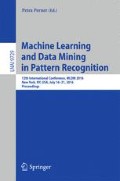Abstract
The goal of this study is to develop a method that is capable of inferring geo-locations for non-representative data. In order to protect privacy of surveyed individuals, most data collectors release coarse geo-information (e.g., tract), rather than detailed geo-information (e.g., street, apt number) when sharing surveyed data. Without the exact locations, many point-based analyses cannot be performed. While several scholars have developed new methods to address this issue, little attention has been paid to how to correct this issue when data are not representative. To fill this knowledge gap, we propose a bias correction method that adjusts for the bias using a bias factor approach. Applying our method to an empirical data set with a known bias associated with gender, we found that our method could generate reliable results despite the non-representativeness of the sample.
Access this chapter
Tax calculation will be finalised at checkout
Purchases are for personal use only
Preview
Unable to display preview. Download preview PDF.
References
Schabenber, O., Gotwa, C.A.: Statistical Methods for Spatial Data Analysis. Chapman and Hall/CRC (2005)
Yang, T.C., Kifer, D., Matthews, S.A., Zhang, Y., Bacon, R.: Multiple Imputations of Subregions with Censored Location Data and Statistical Utility Examination (2015) (under review)
Rubin, D.B.: Multiple Imputation for Nonresponse in Surveys. John Wiley&Sons (1987)
Abowd, J.M., Vilhuber, L.: How Protective are Synthetic Data? Privacy in Statistical DataBases, 239–246 (2008)
Emilio, Z., Venkata, R.K., Bogda, S.: Inferring International and Internal Migration Patterns from Twitter Data. In: WWW (2014)
Emilio, Z., Ingmar, W.: Demographic Research with Non-representative Internet Data. In: IJM (2014)
Wang, W., Rothschild, D., Goel, S., Gelman, A.: Forecasting Elections with Non-representative Pools. In: International Institute of Forecasters (2014)
Author information
Authors and Affiliations
Corresponding author
Editor information
Editors and Affiliations
Rights and permissions
Copyright information
© 2016 Springer International Publishing Switzerland
About this paper
Cite this paper
Zhang, Y., Yang, TC., Matthews, S.A. (2016). Inferring Censored Geo-Information with Non-Representative Data. In: Perner, P. (eds) Machine Learning and Data Mining in Pattern Recognition. MLDM 2016. Lecture Notes in Computer Science(), vol 9729. Springer, Cham. https://doi.org/10.1007/978-3-319-41920-6_17
Download citation
DOI: https://doi.org/10.1007/978-3-319-41920-6_17
Published:
Publisher Name: Springer, Cham
Print ISBN: 978-3-319-41919-0
Online ISBN: 978-3-319-41920-6
eBook Packages: Computer ScienceComputer Science (R0)

